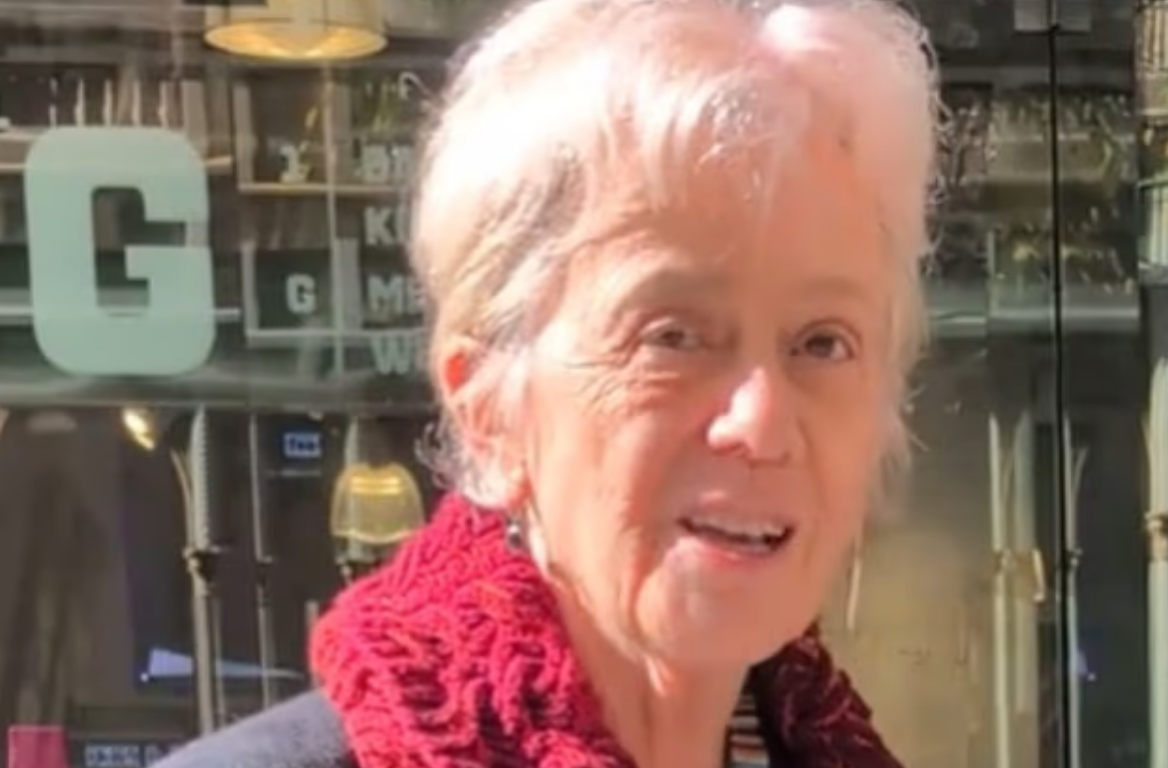
The next time someone tells you that baby boomers 'had it easy,' you might want to share the story of a Sydney woman who's still trudging to work at 74, watching her savings dwindle as rent and grocery bills soar.
Her story, captured in a candid street interview, reveals an uncomfortable truth that challenges everything we think we know about generational wealth in Australia.
While headlines focus on young Australians struggling with cost-of-living pressures, there's a growing cohort of older Australians who find themselves trapped in a financial squeeze they never saw coming.
When $100,000 isn't nearly enough
The 74-year-old Sydney resident, who works in the NSW health system, has $100,000 in savings—a sum that might sound substantial to many younger Australians drowning in debt. But here's the sobering reality: according to the latest ASFA Retirement Standard, singles need at least $595,000 by age 67 for a comfortable retirement.
Her savings represent just 17 per cent of what financial experts say she should have accumulated by now.
'Not really loving it. At times I'm loving it. I like being active, I like working, I like getting out, and that's good. But probably being retired would be my dream job.'
The woman's predicament becomes even starker when you consider the annual costs involved. According to the latest ASFA figures, a comfortable retirement costs $52,383 per year for singles—money she simply doesn't have, especially as someone who doesn't own her home.
The great retirement delay
This Sydney woman isn't alone in working well past traditional retirement age. The average age of retirement in Australia has been rising steadily for decades, from age 53.5 in 2000 to 64.8 in 2022, with women tending to retire one or two years before men on average.
Over the next five years, 710,000 Australians intend to retire, and 226,000 intend to do so over the next two years. But for many, those intentions may prove overly optimistic as financial reality sets in.
Australia's changing retirement landscape
The most common reason for choosing retirement is now access to financial support (31 per cent of respondents), which includes reaching retirement age—currently 67 years old for the age pension—rather than personal choice or health reasons.
The trend towards later retirement isn't just about people choosing to stay active. For a variety of reasons, today's retirees are likely to stay in the workforce for longer than previous generations.
In fact, the workforce participation rate for those aged 65-plus more than doubled in the 20 years from 2001, from 6 per cent to 15 per cent in 2021, driven by improved health outcomes, greater workforce flexibility, higher education levels leading to less physical work, and financial necessity.
The real cost of retirement in 2025
Understanding why this health worker feels trapped requires a look at what retirement actually costs in modern Australia. The figures are sobering.
What you need to retire comfortably in 2025
- Singles need $595,000 in superannuation by age 67
- Couples need $690,000 in superannuation by age 67
- A comfortable retirement includes top-level private health insurance, a reasonable car, nice clothes, fast internet, exercise and leisure activities, occasional restaurant meals, a domestic trip once per year, and an overseas holiday every seven years
- These figures assume you own your home outright and are in good health
For those aiming for a more modest lifestyle, the numbers are more achievable but still challenging. A modest retirement lifestyle costs $48,184 for couples and $33,386 for singles, defined as having basic private health insurance, a cheaper car, basic internet and mobile phone, infrequent exercise and leisure activities, few restaurant meals, and one domestic holiday per year.
Even at this modest level, singles need $100,000 in super with yearly expenses at $33,134, while couples can manage with $100,000 combined, spending $47,731 annually.
The Sydney woman's situation becomes clearer when you realise that her $100,000 savings, while representing the ASFA benchmark for a modest retirement, assumes she owns her home—which she doesn't.
When the family home becomes unaffordable
Housing represents the biggest challenge for older Australians like our Sydney health worker. In 2017-18, 1 in 7 (14 per cent) households with a reference person aged 65 or over were renters, with most renting from a private landlord (64 per cent) and around 1 in 4 (24 per cent) from a state or territory housing authority.
The situation has only worsened since then. Across Australia, rents paid increased by 7.8 per cent from the first quarter of 2024 compared with the first quarter of 2023, with all capital cities except Hobart (-0.4 per cent) experiencing increases ranging from a 9.9 per cent increase in Perth to 1.7 per cent in Canberra.
Often older Australians rent out of necessity rather than choice, and renting at an older age can be associated with the risk of poverty and adverse impacts on health and wellbeing. Older people renting can be disproportionately affected by insecure tenures and be at increased risk of homelessness.
Did you know?
Did you know?
Many older people currently renting had previously been in home ownership, moving into renting due to relationship breakdown or financial hardship—challenging the assumption that older Australians automatically benefit from decades of property ownership.
The woman's comment that Sydney rent prices are 'appalling' reflects a broader crisis. The median rent in Australia is $627 a week for houses and units—a record high, reflecting an 8.5 per cent increase over the previous year. For someone on a fixed income or modest wages, this represents an enormous burden.
The pension reality check
Many people assume that reaching 67 means financial security through the age pension, but the reality is more complex. The full age pension, including all supplements, is $29,874 for singles per year—well below the $52,383 needed for a comfortable retirement.
Despite the growth in superannuation over the past three decades, the Age Pension is still a significant source of income for most Australian retirees, with roughly 39 per cent of Australians of Age Pension age receiving the full Age Pension and a further 24 per cent receiving a part pension.
This means that 63 per cent of retirement-age Australians still depend on government support as their primary income source—a statistic that challenges narratives about self-sufficient older generations.
The cost of living hits harder
The cost-of-living crisis affects different groups differently, and older Australians face particular pressures. Strong annual price rises for tobacco and rents contributed to annual rises for pensioner and beneficiary households (+2.9 per cent), as rents and tobacco make up a higher proportion of expenditure for these household types.
Healthcare represents another major expense. Medical, dental and hospital services make up a larger proportion of expenditure for self-funded retiree households, with costs rising due to increases in health insurance premiums.
The Sydney woman mentioned cooking at home more to save money—a strategy many older Australians are adopting as fruit and vegetable prices rose by 6.6 per cent and meat and seafood prices rose by 4.3 per cent over the 12 months to 31 March.
Beyond the stereotypes
The health worker's story challenges common misconceptions about generational wealth. While property-owning baby boomers have indeed benefited from decades of capital growth, there's a significant subset who missed out on the property boom, faced relationship breakdowns, dealt with business failures, or simply never earned enough to build substantial savings.
National Seniors Australia surveyed 5,806 people aged 50 or over about recent cost-of-living increases and the impact they have had on their lives, focusing on personal experiences and the multitude of ways older individuals have responded to the cost-of-living crisis.
Example Scenario
- Margaret, 68, worked as a teacher for 40 years but took time off to care for aging parents and raise children. A divorce at 55 meant splitting superannuation assets. Now renting a small unit in Brisbane, she works part-time at a bookshop to supplement her part pension, finding that her teaching pension and age pension combined still leave her $200 short each week for basic living expenses.
Support available for struggling seniors
For older Australians facing financial hardship, several support options exist:
Government assistance:
- Age Pension increases occur twice yearly, with the maximum full Age Pension increasing $29.70 per fortnight for a single person from 20 September 2025
- Commonwealth Rent Assistance received a 10 per cent increase in 2024, on top of the 15 per cent increase provided in 2023 to assist renters with rising housing costs
- The work bonus allows pensioners to earn up to $300 per person per fortnight (up to $11,800 per year) without affecting Age Pension payments
Housing support:
- Some state governments provide rental properties for people over 65 on low incomes through affordable rental schemes
- Commonwealth Rent Assistance provides payment to eligible individuals who pay private rent, at 75 cents for every dollar above a minimum rental threshold until a maximum rate is reached
The path forward
The Sydney health worker's story serves as a wake-up call about retirement preparedness across all generations. Her situation illustrates that the cost-of-living crisis isn't just a young person's problem—it's affecting Australians of all ages who find themselves caught between rising costs and fixed or limited incomes.
As one financial expert noted, 'Australians in retirement are starting to benefit from a slowdown in inflation, but the prices of essentials are still rising. It's a timely reminder that achieving a dignified retirement takes planning, and superannuation plays a critical role in making that possible.'
For those still working, her story underscores the importance of:
- Building superannuation balances well beyond the minimum
- Considering housing security as part of retirement planning
- Understanding the gap between Age Pension payments and actual living costs
- Seeking professional financial advice early rather than late
Breaking the generational divide
Perhaps most importantly, the 74-year-old's candid admission that she'd rather be retired reminds us that financial stress doesn't discriminate by age.
While young Australians face challenges entering the property market and building careers, older Australians like this health worker face the reality of working until they physically can't, with little hope of the comfortable retirement they'd dreamed of.
Rather than viewing this as a competition between generations, her story suggests we need better support systems for all Australians struggling with cost-of-living pressures—whether they're 24 or 74.
What This Means For You
The next time you hear someone say that older Australians 'have it easy,' remember the woman who's still getting up for work each day at 74, not because she loves her job, but because she simply can't afford to stop.
What do you think needs to change to ensure all Australians can achieve a dignified retirement? Have you or someone you know faced similar challenges in later life? Share your thoughts and experiences in the comments below.
Original Article
https://www.dailymail.co.uk/money/a...tml?ns_mchannel=rss&ns_campaign=1490&ito=1490
ASFA Retirement Standard: What It Entails | Aged Care Weekly news, information resources.
Cited text: As you can see, it is slightly better than the limited age pension, so it should be able to provide for your daily needs and an every-so-often persona...
Excerpt: The 74-year-old Sydney resident, who works in the NSW health system, has $100,000 in savings—a sum that might sound substantial to many younger Australians drowning in debt.
https://agedcareweekly.com.au/asfa-retirement-standard/
ASFA Retirement Standard: What It Entails | Aged Care Weekly news, information resources.
Cited text:
Excerpt: According to the latest ASFA figures, a comfortable retirement costs $52,383 per year for singles
https://agedcareweekly.com.au/asfa-retirement-standard/
What is the retirement age in Australia?
Cited text: The average age of retirement in Australia has been rising steadily for decades, from age 53.5 in 2000 to 64.8 in 2022, with women tending to retire o...
Excerpt: The average age of retirement in Australia has been rising steadily for decades, from age 53.5 in 2000 to 64.8 in 2022, with women tending to retire one or two years before men on average.
https://www.superguide.com.au/retirement-planning/retirement-age-australia
What's the average age of retirement in Australia?
Cited text: Over the next five years, 710,000 Australians intend to retire, and 226,000 intend to do so over the next two years.
Excerpt: Over the next five years, 710,000 Australians intend to retire, and 226,000 intend to do so over the next two years.
https://www.fool.com.au/2024/05/27/whats-the-average-age-of-retirement-in-australia/
What's the average age of retirement in Australia?
Cited text: The most common reason for choosing retirement was access to financial support (31 per cent of respondents). This includes reaching retirement age, which is t...
Excerpt: The most common reason for choosing retirement is now access to financial support (31 per cent of respondents), which includes reaching retirement age—currently 67 years old for the age pension
https://www.fool.com.au/2024/05/27/whats-the-average-age-of-retirement-in-australia/
What is the retirement age in Australia?
Cited text: ... For a variety of reasons, today’s retirees are likely to stay in the workforce for longer than previous generations. In fact, the workforce partic...
Excerpt: For a variety of reasons, today's retirees are likely to stay in the workforce for longer than previous generations.
https://www.superguide.com.au/retirement-planning/retirement-age-australia
ASFA Retirement Standard: What It Entails | Aged Care Weekly news, information resources.
Cited text: It is updated quarterly, every year, so that it can reflect inflation. The slightly better financial aid than the average age pension that the governm...
Excerpt: A comfortable retirement includes top-level private health insurance, a reasonable car, nice clothes, fast internet, exercise and leisure activities, occasional restaurant meals, a domestic trip once per year, and an overseas holiday every…
https://agedcareweekly.com.au/asfa-retirement-standard/
How much do you need to retire comfortably? The latest from ASFA
Cited text: Each quarter, ASFA updates a guide that outlines how much singles and couples need to spend in retirement to enjoy either a modest or comfortable life...
Excerpt: These figures assume you own your home outright and are in good health
https://www.hphsolutions.com.au/how-much-do-you-need-to-retire-comfortably-the-latest-from-asfa/
ASFA Retirement Standard: What It Entails | Aged Care Weekly news, information resources.
Cited text: However, even if it’s limited, it can still afford the necessary activities and personal needs. It is an ideal budget plan for those who desire simple...
Excerpt: A modest retirement lifestyle costs $48,184 for couples and $33,386 for singles, defined as having basic private health insurance, a cheaper car, basic internet and mobile phone, infrequent exercise and leisure activities, few restaurant…
https://agedcareweekly.com.au/asfa-retirement-standard/
How much do you need to retire comfortably? The latest from ASFA
Cited text: If you’re approaching retirement and feeling unsure whether you’re “on track,” you’re not alone.
Excerpt: singles need $100,000 in super with yearly expenses at $33,134, while couples can manage with $100,000 combined, spending $47,731 annually.
https://www.hphsolutions.com.au/how-much-do-you-need-to-retire-comfortably-the-latest-from-asfa/
How much do you need to retire comfortably? The latest from ASFA
Cited text: It’s about aligning your financial situation with the kind of life you want to lead in retirement.
Excerpt: singles need $100,000 in super with yearly expenses at $33,134, while couples can manage with $100,000 combined, spending $47,731 annually.
https://www.hphsolutions.com.au/how-much-do-you-need-to-retire-comfortably-the-latest-from-asfa/
Housing affordability—Australian Institute of Health and Welfare
Cited text: Affordability is important for both Australians wanting to buy a home and for those renting. Many factors influence the supply, demand and cost of hou...
Excerpt: In 2017-18, 1 in 7 (14 per cent) households with a reference person aged 65 or over were renters, with most renting from a private landlord (64 per cent) and around 1 in 4 (24 per cent) from a state or territory housing authority.
https://www.aihw.gov.au/reports/australias-welfare/housing-affordability
Cost of Living—National Seniors Australia
Cited text: A 12 month freeze on deeming rates has been provided in the 2024 Budget until 30 June 2025 ensuring pension payments do not reduce as inflation rises....
Excerpt: Across Australia, rents paid increased by 7.8 per cent from the first quarter of 2024 compared with the first quarter of 2023, with all capital cities except Hobart (-0.4 per cent) experiencing increases ranging from a 9.9 per cent increase in Perth to 1…
https://nationalseniors.com.au/advocacy/current/cost-of-living
Cost of Living—National Seniors Australia
Cited text:
Excerpt: Across Australia, rents paid increased by 7.8 per cent from the first quarter of 2024 compared with the first quarter of 2023, with all capital cities except Hobart (-0.4 per cent) experiencing increases ranging from a 9.9 per cent increase in Perth to 1…
https://nationalseniors.com.au/advocacy/current/cost-of-living
Housing affordability—Australian Institute of Health and Welfare
Cited text: Access to good quality, affordable housing is fundamental to wellbeing. It can help reduce poverty and enhance equality of opportunity, social inclusi...
Excerpt: Often older Australians rent out of necessity rather than choice, and renting at an older age can be associated with the risk of poverty and adverse impacts on health and wellbeing.
https://www.aihw.gov.au/reports/australias-welfare/housing-affordability
Housing affordability—Australian Institute of Health and Welfare
Cited text: Throughout 2023, house prices have risen compared to the same time period in 2022 (CoreLogic 2024).
Excerpt: Many older people currently renting had previously been in home ownership, moving into renting due to relationship breakdown or financial hardship
https://www.aihw.gov.au/reports/australias-welfare/housing-affordability
How older Australians can help with housing
Cited text: We believe housing professionals can change the world.
Excerpt: The median rent in Australia is $627 a week for houses and units—a record high, reflecting an 8.5 per cent increase over the previous year.
https://www.theahi.com.au/spare-bed...s-how-older-australians-can-help-with-housing
How older Australians can help with housing
Cited text: Minor policy amendments, including extension of the Work Bonus scheme and/or a CGT ‘holiday’ may be required and justified, given the urgency of addre...
Excerpt: The median rent in Australia is $627 a week for houses and units—a record high, reflecting an 8.5 per cent increase over the previous year.
https://www.theahi.com.au/spare-bed...s-how-older-australians-can-help-with-housing
ASFA Retirement Standard: What It Entails | Aged Care Weekly news, information resources.
Cited text: Look at your lifestyle right now and take your time in having a general understanding of what you wish to do in the future, look at your work status, ...
Excerpt: The full age pension, including all supplements, is $29,874 for singles
https://agedcareweekly.com.au/asfa-retirement-standard/
Age Pension rates (September 2025 to March 2026)
Cited text: Despite the growth in superannuation over the past three decades, the Age Pension is still a significant source of income for most Australian retirees...
Excerpt: Despite the growth in superannuation over the past three decades, the Age Pension is still a significant source of income for most Australian retirees, with roughly 39 per cent of Australians of Age Pension age receiving the full Age Pension and a…
https://www.superguide.com.au/in-retirement/age-pension-rates
The cost of living in Australia 2025
Cited text: The average quarterly electricity bill will set Australians back $393 while gas costs an average $203 every 3 months. 27 per cent of Aussies say energy bills ...
Excerpt: Strong annual price rises for tobacco and rents contributed to annual rises for pensioner and beneficiary households (+2.9 per cent), as rents and tobacco make up a higher proportion of expenditure for these household types.
https://www.upmove.com.au/post/cost-of-living-in-australia
The cost of living in Australia 2025
Cited text: 27 per cent of Aussies say energy bills are giving them financial stress. Annual wage growth reached 4.1 per cent—the first time in 15 years that wages have grown b...
Excerpt: Medical, dental and hospital services make up a larger proportion of expenditure for self-funded retiree households, with costs rising due to increases in health insurance premiums.
https://www.upmove.com.au/post/cost-of-living-in-australia
ASFA Retirement Standard: What It Entails | Aged Care Weekly news, information resources.
Cited text: For a couple, the retirement income should be a lump sum of about $640,000.
Excerpt: fruit and vegetable prices rose by 6.6 per cent and meat and seafood prices rose by 4.3 per cent over the 12 months to 31 March
https://agedcareweekly.com.au/asfa-retirement-standard/
Cost of Living 2025: Everything you need to know about handling rising living costs | Mozo
Cited text: How much does it cost to live in Australia? It’s not just a high school economics question.
Excerpt: National Seniors Australia surveyed 5,806 people aged 50 or over about recent cost-of-living increases and the impact they have had on their lives, focusing on personal experiences and the multitude of ways older individuals have responded…
https://mozo.com.au/family-finances/cost-of-living-guide
Age Pension rates (September 2025 to March 2026)
Cited text: According to Rice Warner, roughly 39 per cent of Australians of Age Pension age receive the full Age Pension and a further 24 per cent receive a part pension. ... Fro...
Excerpt: Age Pension increases occur twice yearly, with the maximum full Age Pension increasing $29.70 per fortnight for a single person from 20 September 2025
https://www.superguide.com.au/in-retirement/age-pension-rates
Cost of Living 2025: Everything you need to know about handling rising living costs | Mozo
Cited text: · The biggest contributors to inflation in the December quarter 2024 were alcohol and tobacco, and recreation and culture. · Price rises for rent, ne...
Excerpt: Commonwealth Rent Assistance received a 10 per cent increase in 2024, on top of the 15 per cent increase provided in 2023 to assist renters with rising housing costs
https://mozo.com.au/family-finances/cost-of-living-guide
Age Pension rates (September 2025 to March 2026)
Cited text: It’s important to note that you can earn up to $300 per person per fortnight (up to $11,800 per year) from working and this amount is not included in ...
Excerpt: The work bonus allows pensioners to earn up to $300 per person per fortnight (up to $11,800 per year) without affecting Age Pension payments
https://www.superguide.com.au/in-retirement/age-pension-rates
Cost of Living in Australia. Prices in Australia. Updated Aug 2025
Cited text:
Excerpt: Some state governments provide rental properties for people over 65 on low incomes through affordable rental schemes
https://www.numbeo.com/cost-of-living/country_result.jsp?country=Australia
ASFA Retirement Standard: What It Entails | Aged Care Weekly news, information resources.
Cited text: To support a modest lifestyle after retiring, the ASFA states that single retirees require an income of around $28,500 p.a. A couple will need approxi...
Excerpt: As one financial expert noted, 'Australians in retirement are starting to benefit from a slowdown in inflation, but the prices of essentials are still rising.
https://agedcareweekly.com.au/asfa-retirement-standard/







